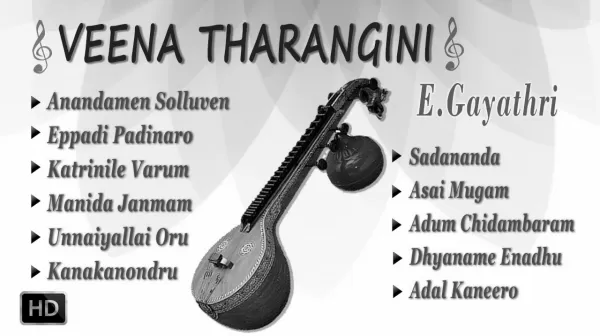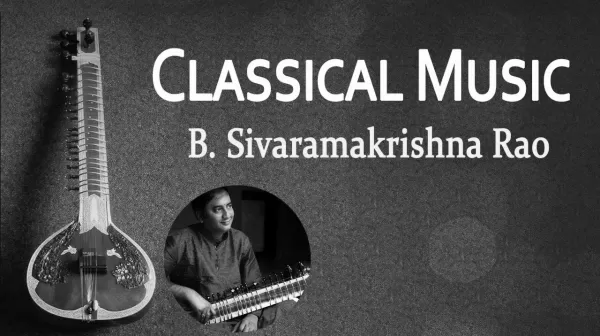Geethanjali - Indian Classical Music
Nadaswaram & Thavil ❤️ Classical Instrumental ❤️ MPN Sethuraman & MPN Ponnusamy ❤️ Jukebox
Listen to Nadaswaram and Thavil | Classical Instrumental Music | MPN Sethuraman & MPN Ponnusamy Vallabha Nayaka - 00:03 Nekkurugi - 04:23 Brochevarevarura - 08:43 Kavava Varali - 16:31 Thavil Solo - 30:55 Marugelara - 41:43 Smaravaram Varam - 45:48 Kandan Karunai - 49:36 Western Notes - 52:58 Thirupugazh - 55:07 Mangalam - 56:33 Nadaswaram, nagaswaram, nadhaswaram or nathaswaram, is a double reed wind instrument. It is a traditional classical instrument originated in Tamil Nadu and also used in Andhra Pradesh, Karnataka, and Kerala (India).
U. Srinivas ❤️ Mandolin Melodies ❤️ Classical Instrumental ❤️ Audio Jukebox
Listen to Mandolin Melodies by U.Srinivas - Classical Instrumental Music - Audio Jukebox Ninnuvina Navarasa - 00:03 Tatvamariya Tarama - 06:30 Kruipajoo Chuta - 15:40 Ananda Natam Aduvar - 20:24 Sukhi Evvaro - 24:14 Theeratha Vilayattu Pillai - 28:04 Thanthanana - 35:39 Thillana - 53:08 Western Note - 57:05 Uppalapu Srinivas was a virtuoso Indian mandolin maestro and composer belonging to the classical Carnatic musical tradition of Southern India. Srinivas is regarded as the Mozart of classical Indian music.
Classical Fusion ❤️ YAKSHAS ❤️ Blend Of Sitar ❤️ Flute ❤️ Tabla ❤️ B.Sivaramakrishna Rao & B.V.Balasai
Listen to Yakshas | Classical Fusion | Blend of Sitar, Flute and Tabla | Audio Jukebox Naivedyam ( Divine Offerings) - 00:03 Pareeksha ( Test Of The Spirit) - 02:36 Kreeda ( Game Of Joy) - 08:27 Atma Sukham ( Soul Satisfaction) - 13:29 Viraha Vedham ( Divine Longing ) - 18:40 Laya Gaatram ( Body Of Soul ) - 24:07 Moksha (Salvation) - 30:13 Salapam (A Musical Theme) - 46:04 Yaksha (Sanskrit यक्ष yaksa, Pali yakkha) is the name of a broad class of nature-spirits, usually benevolent, who are caretakers of the natural treasures hidden in the earth and tree roots.
Classical Fusion ❤️ A Divine Blend Of Sitar & Saxophone ❤️ B.Sivaramakrishna Rao &V.Janardhan ❤️Jukebox
Listen to Fusion, a Divine Blend of Sitar and Saxophone | B. Sivaramakrishna Rao and V. Janardhan | Classical Fusion Music Mryugnayani - 00:03 Varaleela Gana Lola - 07:18 Sunadham - 10:02 Shankara Shiva Shankara - 17:56 Salapam, A Musical Theme - 23:35 Thillana - 31:34 Sitar is a plucked stringed instrument used mainly in Hindustani music and Indian classical music. The instrument is believed to have been derived from the veena, an ancient Indian instrument. The sitar flourished in the 16th and 17th centuries and arrived at its present form in 18th century India.
Flute & Gottuvadyam ❤️ Classical Instrumental ❤️ A. Durgaprasad & B.V.Balasai ❤️ Jukebox
Listen to Flute and Gottuvadyam | A. Durgaprasad & B.V.Balasai | Classical Instrumental Music Nanuganna Thalli - 00:03 Kanjadalayathakshi - 03:51 Mamavasada Janani - 08:49 Thaye Tripura Sundari - 15:16 Mamava Meenakshi - 22:45 Naan Oru - 48:48 Raja raja - 53:56 Ranjini Mala - 1:00:24 Bhagayada Lakshmi - 1:08:47 Flute is a family of musical instruments in the woodwind group. Unlike woodwind instruments with reeds, a flute is an aerophone or reedless wind instrument that produces its sound from the flow of air across an opening.
Sudha Ragunathan, M.L.Vasanthakumari, M.Balamuralikrishna ❤️ Classical Vocal ❤️ Sri Rama Jaya Rama ❤️
Listen to Sri Rama Jaya Rama - Classical Vocal Music - Sudha Ragunathan, M. L. Vasanthakumari, M. Balamuralikrishna Marugelara - 00:03 Intha Kannaranda Memmi - 05:33 Sri Rama Jaya Jaya - 10:47 Jagadananda Karaka - 14:18 Neeradina Sri Rama - 24:57 Kanuganu Sowkiyamu - 30:15 Ezhil Udaya Raghavane - 44:24 Kana Kana Ruchira - 47:24 Carnatic music, is a system of music commonly associated with the southern part of the Indian subcontinent, with its area roughly confined to five modern states of India: Andhra Pradesh, Telangana, Karnataka, Kerala, and Tamil Nadu.
Bharatanatyam Dance Performance ❤️ Madura Margam ❤️ Carnatic Classical ❤️ Prof.Sudharani Raghupathy
Listen to Madura Margam In Bharatanatyam | Carnatic Classical Vocal Music | Prof. Sudharani Raghupathy Ranganjali (Jaya Jaya Shambho) - 00:03 Jatiswaram - 08:23 Keertanam (Deva Mahadeva) - 15:50 Varnam (Aadharam Neeye) - 19:37 Thillana - 53:34 Bharatanatyam or Bharathanatiyam is a major genre of Indian classical dance that originated in the Hindu temples of Tamil Nadu and neighboring regions.
Navasandhi Kauthuvam In Bharatanatyam ❤️ Carnatic Classical ❤️ Prof. Sudharani Raghupathy
Listen to Navasandhi Kauthuvam In Bharatanatyam | Carnatic Classical Music | Prof. Sudharani Raghupathy Prayer Song - 00:03 Brahma - 02:47 Indra - 07:44 Agni - 11:55 Yama - 15:09 Nirruthi - 18:20 Varuna - 22:17 Vaayu - 25:23 Kubera - 28:24 Eeshaana - 32:10 Slokam - 35:18 Taanam - 43:01 Bharatanatyam or Bharathanatiyam is a major genre of Indian classical dance that originated in the Hindu temples of Tamil Nadu and neighboring regions.
Madura Thillanas In Bharatanatyam ❤️ Carnatic Classical Music ❤️ Prof. Sudharani Raghupathy
Listen to Madura Thillanas In Bharatanatyam, Performed under the Direction of Prof.Sudharani Raghupathy 00:03 - Prayer - Slokam 03:07 - Hamsanadham (In Praise Of Krishna) 11:04 - Kannada (In Praise Of Ganesha) 20:06 - Amritavarshini (In Praise Of Saraswathi) 31:32 - Karnataka Devagandhari (In Praise Of Adiparasakthi) 41:10 - Hindolam (In Praise Of Raja Rajeshwari) 50:59 - Brindavana Saranga Bharatanatyam or Bharathanatiyam is a major genre of Indian classical dance that originated in the Hindu temples of Tamil Nadu and neighboring regions.
Vande Mataram Song ❤️ Instrumental (Sitar) ❤️ National Song Of India ❤️ Independence Day
Vande Mataram - Independence Day 2016 - "Proud to be an Indian. This is a tribute to our motherland". A meditative Vande Mataram. Mother India in tranquility!! Vande Mataram - literally, "I pray/bow down to thee, Mother" - is a poem from Bankim Chandra Chattopadhyay's 1882 novel Anandamath. It was written in Bengali and Sanskrit. It is a hymn to the Mother Land. It played a vital role in the Indian independence movement, first sung in a political context by Rabindranath Tagore.










